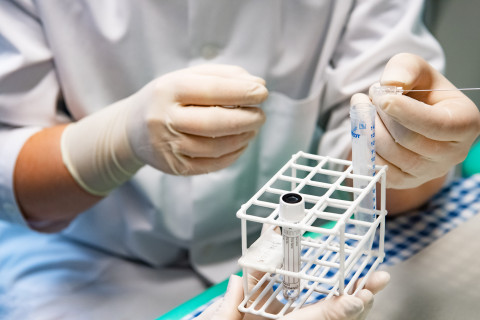The Brain Research Unit of the University of Eastern Finland takes part in an EU project aiming to develop a fast, reliable, cost-effective and digitally enabled point-of-care in-vitro diagnostic system for early Alzheimer's disease detection. The system employs cutting-edge 2D materials such as graphene, as well as nanomaterials and aptamers, to enhance biocompatibility, sensitivity, and specificity for simultaneously detecting up to 5 Alzheimer’s disease biomarkers in blood. A user-friendly mobile app will give real-time access to quantified results to healthcare professionals.
The 2D-BioPAD consortium is composed of 11 partners across 8 European countries and has secured four-year funding from the EU's Horizon Europe programme. The total budget is six million euros, of which UEF's budget is approximately 800 000 euros.
“The UEF Brain Research Unit is leading the work package including multinational clinical pilot studies for evaluation and validation of the new diagnostic system. The biomarker laboratory at the Brain Research Unit has a key role in this project. We are also working together with the Neuro-Ethics and Law Research Team at UEF Law School to ensure that ethical aspects are given proper consideration,” says Associate Professor Alina Solomon, Principal Investigator for the project at the University of Eastern Finland.
“The importance of new biomarkers will be emphasized in the near future. As new disease-modifying drugs become available, diagnostics need to be faster and more accurate. In an optimal situation, individuals experiencing cognitive symptoms could be screened as early as in primary healthcare,”says Eino Solje, Research Director at UEF Brain Research Unit.
Regulatory and ethical considerations will be included in the project design to allow for faster and widespread adoption in primary healthcare settings. Artificial Intelligence will be used for optimising the design and implementation of the 2D-BioPAD system.
Launched in October, the 2D-BioPAD project is coordinated by the CATRIN Institute of the Czech Palacky University Olomouc, and the other partners are the University of Eastern Finland, Catalan Institute of Science and Nanotechnology (ICN2), Aristotle University of Thessaloniki (AUTh), Greek Association of Alzheimer's Disease and Related Disorders (GAADRD), Central Institute of Mental Health in Manheim (ZI), industrial partners Q-Plan International, Grapheal, Novaptech and Evnia, as well as University College Dublin (NUID UCD) with Ireland’s Center for Applied AI (CeADAR).
2D-BioPAD is one of the core governing members of the European Graphene Flagship Initiative.
For further information, please contact:





